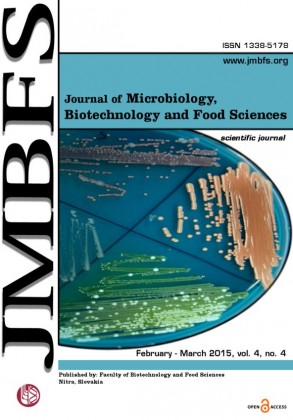IN VITRO SUPPLEMENTATION OF RESVERATROL TO BOVINE SPERMATOZOA: EFFECTS ON MOTILITY, VIABILITY AND SUPEROXIDE PRODUCTION
DOI:
https://doi.org/10.15414/jmbfs.2015.4.4.336-341Keywords:
Resveratrol, spermatozoa, bulls, motility, viability, oxidative stressAbstract
The aim of this study was to assess the dose- and time dependent in vitro effects of resveratrol (RES), a natural polyphenol and phytoalexin with potential antiviral, anti-inflammatory and antioxidant properties on bovine spermatozoa during five different time periods (0h, 2h, 6h, 12h and 24h). Semen samples were collected from 20 adult breeding bulls, and diluted in physiological saline solution containing 0.5% DMSO together with 0, 1, 5, 10, 50, 100 and 200 μM/L RES. Spermatozoa motility was examined using the Sperm VisionTM and CASA (Computer Assisted Semen Analyzer) system. Cell viability was measured using the metabolic activity MTT assay, the nitroblue-tetrazolium (NBT) test was used to assess the intracellular superoxide formation. The initial CASA analysis showed no significant changes in the spermatozoa motion parameters, however a motion-promoting effect of 10 and 50 μM/L RES became significant after 2h (P<0.05), and maintained this status throughout the in vitro culture (6h, 12h, 24h; P<0.001). Meanwhile, both motility parameters were significantly decreased in the group A (P<0.001) and B (P<0.05), supplemented with the highest concentration of RES (200 and 100 μM/L RES; respectively), after a comparison with the control group. According to the MTT assay, instant RES administration (0h) had a significant beneficial effect on the cell viability in the experimental groups supplemented with 10 and 50 μM/L RES. These effects remained visible and statistically relevant (P<0.001) throughout all MTT examinations. Similar to the CASA analysis, the MTT test revealed an inhibition in the cell viability followed by the administration of 100 and 200 μM/L RES (P<0.001). Although RES had no immediate effects on the spermatozoa oxidative balance during the in vitro culture, further experiments revealed that the administration of 1-50 μM RES led to a significant decline of the superoxide formation in comparison to the control (P<0.001, P<0.01, P<0.05; respectively), while a significant increase in the superoxide concentration was detected following administration of 100 and 200 μM RES (P<0.05 and P<0.001; respectively). The results indicate that the addition of resveratrol, specifically at 5-50 μM/L to the culture medium could be beneficial for the overall stimulation of spermatozoa activity and protection against possible in vitro oxidative stress development.Downloads
Download data is not yet available.
Downloads
Published
2015-02-01
How to Cite
Tvrdá, E., LukáÄ, N., LukáÄová, J., Hashim, F., & Massányi, P. (2015). IN VITRO SUPPLEMENTATION OF RESVERATROL TO BOVINE SPERMATOZOA: EFFECTS ON MOTILITY, VIABILITY AND SUPEROXIDE PRODUCTION. Journal of Microbiology, Biotechnology and Food Sciences, 4(4), 336–341. https://doi.org/10.15414/jmbfs.2015.4.4.336-341
Issue
Section
Biotechnology
License
Copyright (c) 2015 Eva Tvrdá, Norbert LukáÄ, Jana LukáÄová, Faridullah Hashim, Peter Massányi

This work is licensed under a Creative Commons Attribution 4.0 International License.
All papers published in the Journal of Microbiology, Biotechnology and Food Sciences are published under a CC-BY licence (CC-BY 4.0). Published materials can be shared (copy and redistribute the material in any medium or format) and adapted (remix, transform, and build upon the material for any purpose, even commercially) with specifying the author(s).





